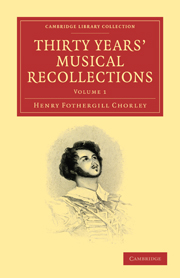THE YEAR 1837
Published online by Cambridge University Press: 29 August 2010
Summary
During the winter of 1836–7, an attempt had been made at the Lyceum Theatre to establish a Comic Opera. To this we owed the introduction in this country of Donizetti's “LElisir;”—an effort to make England like Signor Ricci's “Scaramuccia,” and Signor Coppola's “Nina Pazza,”—also the revival, after twenty years, of Mozart's “Le Nozze.” The speculation, though resumed in the early winter of 1837–8, was understood not to have been successful. The new Italian compositions were not relished.
Nor was this disregard unjust. The prettiness of Signor Ricci's comic music could not conceal its writer's want of style and science. The story he set is puerile—in the worn-out Italian taste; and, so far as I know, his name has already died away in Italy, except in those third-rate theatres, to listen to music in which gives a shock to every sense; where the singers are bad, the buffoonery is violent, and the audiences (to be lenient) want washing. The only one time when I was ever seduced into sleep at a theatre, was over an Opera of Ricci's at Florence :—and not because the Opera was poor; but because the vocalists were execrable, and the atmosphere of garlic and from crowding humanity amounted to a smell strong enough, as the Irishman said, “to hang one's hat on.”
Signor Coppola's “Nina” stood a still poorer chance with us. Though, for a while, it displaced the better “Ninas” of Paisiello and Dalayrac, and was even translated for the Opera Comique of Paris—there to bring out Madame Eugenie Garcia—even the simple prettiness of the story, and the scope afforded the actress, could not save music so utterly stale.
- Type
- Chapter
- Information
- Thirty Years' Musical Recollections , pp. 118 - 139Publisher: Cambridge University PressPrint publication year: 2009First published in: 1862



